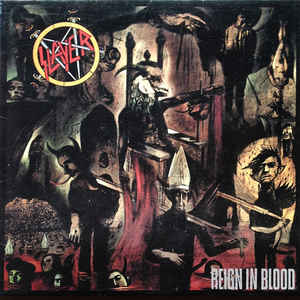Looking back on the milestones of metal.
To start the year off with a double kick, we’re looking at five upcoming album anniversaries in 2021 of some of the most iconic heavy metal records from the past, tracing the impact they left on legions of heavy metal fans and the industry at large.
Black Sabbath – Master of Reality (1971)

The third studio album by Black Sabbath, Master of Reality has been heralded by critics and contemporary artists as a foundation for doom, sludge, and stoner metal. Marked as the band’s first “plunge into darkness” by band biographer and music journalist Mick Hall, Master of Reality defined a menacing tone for generations to follow.
The album’s signature heavier overtones and down-tuned guitar riffs were famously due to guitarist Tony Iommi having to loosen the strings to compensate for pain as the result of an accident years earlier in which he had the tips of two of his fingers severed. Not to be out-done by his fellow string slinger, bassist Geezer Butler followed suit with his own instrument, linking up with the relentless rhythms of drummer Bill Ward to forge Master of Reality‘s formidable sound.
Read all the latest features, columns and more here.
‘Children of the Grave’ and ‘Into the Void’ are prime exhibits of the album’s heavy and ominous guitar and bass interplay, with their foreboding tones and jagged structures laying down a a suitably dark backdrop for Ozzy Osbourne’s shrill high-pitched vocals to cut through over the top.
Master of Reality’s collision of down-tuned guitars, pounding rhythms and an omnipresent bleak atmosphere proved to be a landmark moment in metal’s earliest phase, and set a dark and doomy soundscape for bands to latch onto in the years to come.
Metallica – Master of Puppets (1986)

Metallica’s Master of Puppets may be the bands most defining album in its vast and storied catalogue and an album that is not just synonymous with Metallica, but with heavy metal on a whole.
Revitalising life into the American metal scene in the mid 1980’s, Master of Puppets delivered a more layered and characterised project compared to the previous two albums.
The last album recorded before the untimely death of Metallica bassist Cliff Burton in 1986, Master of Puppets showcased multilayered compositions and technical precision while still maintaining the fast-paced thrash sound heard and helped developed by Burton on Ride the Lightning.
Heralded for its technical precision and composition, Master of Puppets showcased production unlike any heavy metal album to date. Recording in different studios in both America and Denmark, Metallica’s drummer Lars Ulrich has gone on record in 2017 to say the record “sounds a little too tight”.
By the early 1990s, Master of Puppets became the first thrash metal album to turn platinum, an achievement that not only brought metal out of dark band rooms, but brought the sound to a new benchmark and to new audiences in a redefined musical mainstream.
Slayer – Reign in Blood (1986)

The third studio album by Slayer, Reign in Blood is regarded as one of the most influential and significant thrash metal albums of all time.
Praised for Jeff Hanneman and Kerry King’s intense and technical guitar riffs, fast paced production and rhythm and the albums graphically dark and violent lyrics, Reign in Blood continued Metallica’s trend for ground-breaking Thrash metal in America.
Reign in Blood also marked Slayer’s first collaboration with producer Rick Rubin, a relationship that would carry on through to the band’s second last album World Painted Blood released in 2009.
Previously working largely as a hip hop producer for artists such as Run-DMC and LL Cool J, Rubin’s influence is most notable on Reign in Blood for not just it’s clean recording and production, but the intense tempo and pace the album was played at.
Clocking in at a tight 28.55-minute runtime, Reign in Blood was a pioneer for lean, fast thrash albums. Fitting on the single side of a cassette on release and bookended by two of Slayer’s most iconic songs ‘Angel of Death’ and ‘Raining Blood’, Reign in Blood is synonymous with the band’s sound and synonymous with the American thrash metal sound that swept the world in the 1980s.
Opeth – Blackwater Park (2001)

The fifth studio album by Swedish progressive death metal band Opeth, Blackwater Park has been praised by music critics and was marked as the band’s true coming of age as, well as the first collaboration between Mikael Akerfeldt and Steve Wilson from Porcupine Tree.
Shifting between folky soft acoustic riffs and clean vocals by Akerfeldt, Blackwater Park presented not only significant sonic achievements, but also noted thematic juxtaposition in its execution. With majority of the albums tracks ranging between six to ten minutes in length, most with segments of detailed arrangement, the album blends at an intersection of progressive rock and death metal.
Blackwater Park not only marked the early signs of Opeth’s signature sound and arrangement, but also a relationship between Akerfeldt and Wilson that would carry into future projects, such as the duo’s 2010 self-titled concept album Storm Corrosion.
Showcasing front man Akerfeldt’s incredible vocal range and musical breadth, amongst Wilson’s production, Blackwater Park served as a gateway for not just future prog metal bands to come but for much of Opeth’s discography to follow.
System of a Down – Toxicity (2001)

Rounding out the list is the second studio album and breakthrough record Toxicity by American/Armenian metal band System of a Down.
Released amidst a surge of nu-metal records from the likes of Limp Bizkit and Korn in the early 2000s, Toxicity stood apart from its contemporaries with its unique sound.
Branded primarily as an alternative metal album, Toxicity was a release in expanding and diversifying metal further into new unique genres, with the album exploring quirky arrangements and influence from folk, progressive rock, jazz and Armenian music.
Toxicity creates a disaster soundscape of a calm before a storm, showing a familiar style in a unique delivery from its wide array of instruments used on the album including sitar, banjo, piano, keyboards, and an Armenian Oud, a lute-like instrument.
Toxicity blended together not only a mix and range in its instrumentation, but within its vocal theatrics and delivery of lyrics. Throughout the album the vocals are juggled between both Serj Tankian and Daron Malakian’s manic vocal performances, with the outlandish nature of tracks like ‘Chop Suey!’, ‘Aerials’ and the killer title track affirming its status as a rare gem.
From screaming political panic to calm melodic folk harmonies of humorous abstract lyrics, System of a Down delivered a unique sound and charm yet to be matched by many bands to follow.
Looking for songs more specifically? Keep reading about the best heavy metal songs of all time.







